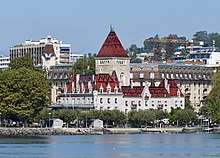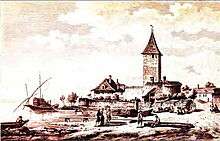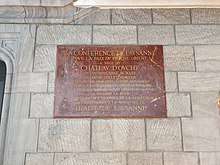Château d'Ouchy
The Château d'Ouchy (Castle of Ouchy) is a hotel built on the site of an old medieval castle in Lausanne, Switzerland by fr:Jean-Jacques Mercier between 1889 and 1893.


It belongs to hotel division of the Sandoz Family Foundation.
History
It was first constructed by the Bishop of Lausanne as a tower on the banks of Lake Léman around 1170. A century later, it was rebuilt and transformed into a fortified residence for bishops, particularly for Guillaume de Varax. It was also used as prison. The castle was abandoned and its tower reduced to ashes in 1609. The canton of Vaud recovered it after the departure of the Berneses and sold off part of the land to Jean-Jacques Mercier in 1885. The new owner radically transformed the castle by demolishing the ruins and old buildings, leaving only the tower.[1]
The castle was rebuilt in the neo-gothic style between 1889 and 1893 and converted into a hotel.[2]

According to J C Grew many of the leading figures of the Treaty of Lausanne were staying at the hotel and there is a plaque commemorating the peace treaty.[3]
Characteristics
- 50 rooms including Suites with views of Lake Geneva.
- 1 restaurant "Le Château d'Ouchy" and a bar.
- An outdoor pool, steam room and sauna.
- Reception halls for conferences, receptions, cocktails and weddings.
- Access to the Cinq Mondes SPA at Beau-Rivage Palace.
Restaurants
- Restaurant "Château d'Ouchy" (Chef: Sébastien Rauch)
- The Bar
- In-room dining service
Notes et references
- Chateau d'Ouchy on the website of the City of Lausanne.
- (in French)« Les châteaux de Lausanne : le château d’Ouchy » swisscastles.ch
- Grew, Joseph C. (1954). "The Peace Conference of Lausanne, 1922-1923". Proceedings of the American Philosophical Society. 98 (1): 1–10. ISSN 0003-049X. JSTOR 3143664.
External links

- Official website
